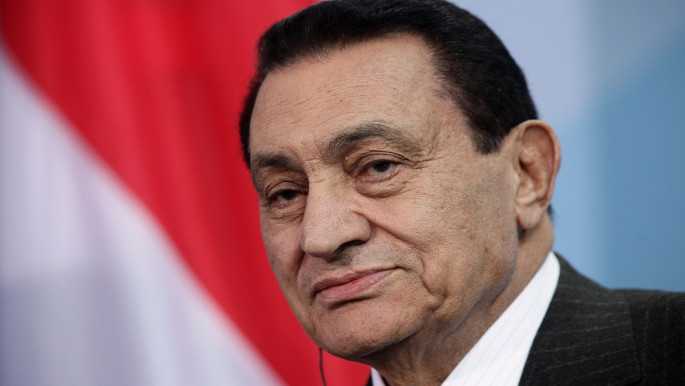The Pharaoh's downfall: How Hosni Mubarak's mistakes came to prime the Egyptian revolution
February 11, 2011 was a day to remember for millions of Egyptians who managed to topple long-time autocrat Hosni Mubarak following an 18-day popular uprising.
Apart from the perseverance of protesters at that time, Mubarak's downfall seemed imminent one decade earlier as people's rage and frustration grew.
Mubarak's almost 30-year rule could be divided into three decades, each representing a phase. The first was relatively successful when he took over the country after the assassination of his predecessor Anwar Sadat at the hands of Islamists on October 6, 1981.
In fact, many believe that Sadat chose an army general like Mubarak with mediocre political skills to act as the second-in-command in order for him to wield power in the country.
But destiny was not in Sadat's favour; and Mubarak became, by coincidence, the president of the most influential Arab country.
Mubarak eventually proved Sadat wrong, restoring diplomatic ties with the Arab countries earlier angered by the peace treaty with Israel as he carried out economic reform domestically.
Mubarak also adopted a strong foreign policy strategy, becoming the most influential ally of the US in the region. For years, he played a key role being a loyal friend of Israel and the USA as he mediated peace in the Middle East.
Egypt's army further took part in the Persian Gulf War, liberating Kuwait from the Iraqi invasion in 1991.
 |
For years, he played a key role being a loyal friend of Israel and the USA as he mediated peace in the Middle East |  |
Throughout the second decade of his reign, Mubarak's ego started to appear on the surface as he seemed to have been convinced by his aides that he was irrepressible and indispensable.
A personality cult gradually started to evolve at the time when media outlets acted as the regime's propaganda machine, advocating for Mubarak and his short-lived economic achievements.
Read also: Hosni Mubarak is dead, but the pharaoh state he helped build lives on
A fallen dynasty
Over Mubarak's extended rule of Egypt, he never allowed for a possible successor, refusing to appoint a vice-president under the pretext that nobody was qualified enough to help him run the country.
 |
|
| Read also: Ten years on, did Egypt's January 25 revolution fail? |
It was only after people revolted against him that he named intelligence chief Omar Suleiman his vice-president.
The growing influence of Mubarak's family, namely his eldest son Alaa, a businessman, his wife Suzanne Thabet, and his youngest son Gamal, a former banker and a politician, could not go unnoticed.
A key factor that led to Mubarak's collapse was putting forward Gamal Mubarak on the political scene in Egypt as his possible successor, especially after the Syrian model where Bashar al-Assad succeeded his dead father Hafez al-Assad.
Such a hypothesis was strongly rejected by Egypt's rising opposition forces and the very few partisan or independent news outlets during the early years of the second millennium.
 |
Mubarak's ego started to appear on the surface as he seemed to have been convinced by his aides that he was irrepressible and indispensable |  |
On the other hand, Egyptian army generals would have never allowed this scenario to take place.
"Top military officers have been in control of Egypt, on different levels, since the coup of 1952 that overthrew the monarchy. They would have never allowed a civilian like Gamal Mubarak to be president," a political analyst told The New Arab on condition of anonymity.
"The army could have simply crushed the revolution from the beginning. But they chose to side beside protesters to exclude Gamal," he added.
Moreover, observers believe that police brutality, vote rigging, poverty and — above all — his and his family members' alleged corruption and profiteering were rampant, leading Egyptians to revolt.
"Staying in power for that long led to his mental stiffness and him maintaining a status quo, which made it an inevitable solution for Mubarak and his family to present his son, Gamal, as an eventual replacement," political sociologist, Said Sadek, told The New Arab.
"Had Mubarak undertaken reform measures, allowed opposition forces in the lower-house of the parliament and limited his family's constant public appearances that provoked the public, he could have avoided a revolution against him," Sadek added.
 |
A key factor that led to Mubarak's collapse was putting forward Gamal Mubarak on the political scene in Egypt as his possible successor |  |
Detachment, denial and oblivion
As the Tunisian revolution broke out, toppling the regime of Zine El Abidine Ben Ali and inspiring other Arab countries to follow its steps, Mubarak ruled out that a similar popular movement could occur in Egypt.
 |
|
| Read also: Hosni Mubarak: The godfather of Egypt’s corrupt police state |
In his recently published memoir, former US president Barack Obama described Mubarak being "oblivious" about the events taking place around him.
Obama raised with him the possibility that the protests that had begun in Tunisia might spread to Egypt.
Nevertheless, "Mubarak had dismissed it, explaining that 'Egypt is not Tunisia,'" Obama wrote.
"Insulated as he was, he would see what he wanted to see, I thought, and hear what he wanted to hear — and none of it boded well," Obama wrote.
According to Sadek, "revolutions are not exportable. Tunisia just inspired the already existing boiling situation for a revolution to erupt in Egypt.
"Mubarak was removed at the time when only natural deaths, assassinations or coups changed regimes," he said.
Counselling psychologist Alaa El-Ghandour could not agree more.
"Mubarak seemed quite detached from reality, living in a state of denial and believing what he was told — that people loved him and wanted nobody else to rule them," El-Ghandour told The New Arab.
"This was clear in the few televised speeches he gave during the 18 days preceding his fall and his attempts to appease the public, claiming he had never sought power," he added.
"When he realised the truth about how Egyptians perceived him, he was in a state of frustration and defeat, a shocking epiphany, as he did not seem to ever realise that his days in power were numbered," El-Ghandour concluded.
In March 2017, a Cairo appeals court acquitted Mubarak after he had been found guilty by a lower court of ordering the killing of peaceful protesters during the January 25 revolution in what was dubbed by the media: "The Trial of the Century."
Mubarak died in his home in Cairo on February 25, 2020 at age 91.
Horriya Marzouk is a pseudonym. The author resides in a jurisdiction where the publication of their identity may create a security or freedom of movement issue
Join the conversation: @The_NewArab





 Follow the Middle East's top stories in English at The New Arab on Google News
Follow the Middle East's top stories in English at The New Arab on Google News


